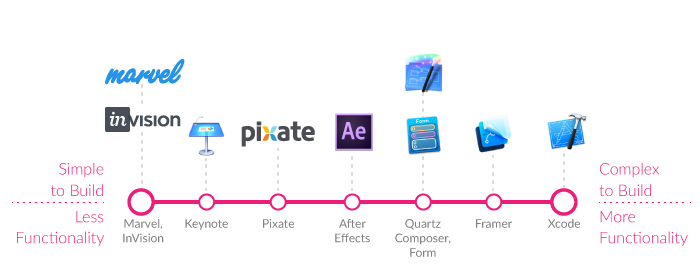Oct 01, 2018
Web design tools In Old-school at 7 Best Tools
Web design is an industry that's constantly evolving and innovating. This means that there are a bunch of new web design tools being released every week and every month. And while these cutting edge tools can cater to the latest demands of web design professionals, there are some older tools for website design that still prove to be surprisingly useful.
To help unearth the best web design applications (Software) of years gone by, we talked to seven web design expert and experts to find out which old-fashioned tools for website design and mobile app design with backend design they simply can't live without. And while these tools might seem a bit basic or long in the tooth, they've stuck around for a reason: they're just really good. So if you're looking to shake up your workflow, be sure to check them out for yourself.
01. Sketch sheets
If you are a UX or UI designer who needs to turn their ideas into sketches of web and mobile app, Sketchize could be the answer. This site is packed with sketch sheets to help web designers create apps for mobile, tablet and desktop devices. Simply print off the relevant sheet, and you've got a wireframe foundation that you can start sketching on.
For GIS application systems analyst Carolyn Novak, Sketchize is her go-to tool for creating wireframes for a new website and mobile app design. She also uses Post-It notes stuck on her office wall to organise content before she mocks it up in HTML and CSS. "A very archaic process, especially since I have access to modern tools.
02. Notepad++
Free source code editor Notepad++ was first developed back in 2003, but it's still going strong. That's because it's still a great tool to educate junior web designers on the fundamentals of markup.
According to Andrew Minton, the head of design at Orchard, it's also a useful way to scare juniors into a false sense of security, with the likes of Dreamweaver confusing matters from the off. He adds: "my advice is to learn the basics, start with a blank page and weave digital dreams from scratch!"
03. Sublime Text
Speaking of code editors, Sublime Text still proves to be useful. Originally developed 11 years ago, Sublime Text is a proprietary cross-platform source code editor that boasts a Python application programming interface.
As well as natively supporting multiple programming and markup languages, Sublime Text's functions can be enhanced with community built plugins. But for Steph Boudreau, the secret to Sublime Text's success is its simplicity.
"Sometimes the newer tools add complexity or extra steps that seem to only complicate things," he says. "Keeping my toolset simple and streamlined (albeit old school) lets me learn new techniques without having to continuously learn new software."
04. Save For website (legacy)
As its name suggests, Photoshop's Save For Web (Legacy) is an older way to save web graphics and web html or css design. But that doesn't mean that it isn't useful anymore. Despite having been succeeded in 2015 by the Export As tool, Save For Web (Legacy) is still used by many, including Alec East, the design director at Narrative industries.
Part of the key to Save For Web's continued popularity is that it's ideal for finding the sweet spot between a small file size and a hideously compressed image.
"But it's the support for animated GIFs in Save For Web that I would really miss," says East. "The ability to tweak the bit depth in cinema graphs and graphic banners so they’re small enough to load quickly: I’m not willing to give that up any time soon!"
05. WebPageTest
An oldie but a goodie, WebPageTest is a handy way to check the performance speed of your website. It might not be perfect for everyone, especially with plenty of shiny new alternatives available, but what's not to love about a tool that helps people to make sense of their situation?
For Sally Lait, the engineering manager at Monzo, WebPageTest is an invaluable tool that she often teams up with other classics such as WAVE and even the W3C HTML/CSS validators.
"I really love that the web's evolution and standards mean these are still relevant and useful," says Lait. "As a guilty pleasure, I also still have Beyond Compare installed, despite not being able to remember the last time I FTPd!"
06. File Transfer Protocol
One person who can remember the last time they FTPd is freelance designer and developer Sush Kelly. For the uninitiated, FTP, or file transfer protocol, is a standard network protocol that's used for the transfer of computer files between a client and a server on a computer network.
But with websites becoming increasingly complicated, the old-school approach of dragging files into servers simply doesn't cut it anymore. This doesn't mean that Kelly completely avoids doing it though.
"Build tools allow us to push our changes to a server knowing that all the files will be going to the right directory and definitely the right server but there is still the odd occasion I will manually upload a few files through an FTP client."
07. Pencil and paper
Tools don't come much more old fashioned than a pencil and paper. But that's just what freelance web designer and developer Robert Fenech uses at the start of every project.
"It just helps me to flesh out how the pages should look and feel, without wasting time in Sketch or Adobe XD," he reveals.
The fluid nature of a pencil means that web designers can quickly get a structure together, and it's the perfect tool to use with Sketchize at the top of this list.


